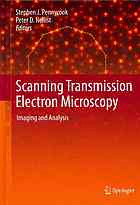
Scanning Transmission Electron Microscopy: Imaging and Analysis PDF
Preview Scanning Transmission Electron Microscopy: Imaging and Analysis
Scanning Transmission Electron Microscopy Scanning Transmission Electron Microscopy Imaging and Analysis Editedby Stephen J. Pennycook Peter D. Nellist 123 Editors StephenJ.Pennycook PeterD.Nellist MaterialsScienceandTechnology DepartmentofMaterials Division UniversityofOxford OakRidgeNationalLaboratory ParksRoad 1BethelValleyRoad Oxford,OX13PH,UK OakRidge,TN37831-6071,USA [email protected] [email protected] ISBN978-1-4419-7199-9 e-ISBN978-1-4419-7200-2 DOI10.1007/978-1-4419-7200-2 SpringerNewYorkDordrechtHeidelbergLondon ©SpringerScience+BusinessMedia,LLC2011 Allrightsreserved.Thisworkmaynotbetranslatedorcopiedinwholeorinpartwithout the written permission of the publisher (Springer Science+Business Media, LLC, 233 SpringStreet,NewYork,NY10013,USA),exceptforbriefexcerptsinconnectionwith reviewsorscholarlyanalysis.Useinconnectionwithanyformofinformationstorage and retrieval, electronic adaptation, computer software, or by similar or dissimilar methodologynowknownorhereafterdevelopedisforbidden. Theuseinthispublicationoftradenames,trademarks,servicemarks,andsimilarterms, eveniftheyarenotidentifiedassuch,isnottobetakenasanexpressionofopinionasto whetherornottheyaresubjecttoproprietaryrights. Printedonacid-freepaper SpringerispartofSpringerScience+BusinessMedia(www.springer.com) Preface Overthelasttwodecades,scanningtransmissionelectronmicroscopy (STEM) has become a very popular and widespread technique, with the number of publications and presentations making use of STEM techniques increasing by about an order of magnitude. Although the strengthsofthetechniqueforprovidinghigh-resolutionstructuraland analytical information have been known and understood for much longerthanthat,thekeytoitsmorerecentpopularityhasundoubtedly beentheavailabilityofSTEMmodesoninstrumentsavailablefromthe majorTEMmanufacturers.Gonearethedayswhenresearcherswant- ing the unique capabilities of high-resolution STEM had to undertake thetaskofkeepingaVGdedicatedSTEMinstrumentoperating. Given the current interest in the technique, we felt that the time was right to review the current state of knowledge about STEM and STEM-related techniques and their application to a range of materials problems. The purpose of this volume is both to educate those who wishtodeepentheirunderstandingofSTEMandtoinformthosewho areseekingareviewofthelatestapplicationsandmethodsassociated withSTEM.Wearedelightedthatsomanyofourcolleaguesaccepted ourinvitationtocontributetothisvolume,andweareindebtedtothem for their efforts in creating such excellent contributions. The follow- ing chapters illustrate how close STEM has brought us to the ultimate materials characterisation challenge of analysing materials atom by atom. We hope that the following chapters demonstrate the spectacular results that can be achieved when performing the relatively simple experiment of focusing a beam of electrons down to an atomic scale andmeasuringthescatteringthatresults. StephenJ.Pennycook PeterD.Nellist v Contents 1 AScanThroughtheHistoryofSTEM 1 StephenJ.Pennycook 2 ThePrinciplesofSTEMImaging 91 PeterD.Nellist 3 TheElectronRonchigram 117 AndrewR.Lupini 4 Spatially Resolved EELS: The Spectrum-Imaging TechniqueandItsApplications 163 MathieuKociak,OdileStéphan,MichaelG.Walls, MarcelTencéandChristianColliex 5 EnergyLossNear-EdgeStructures 207 GuillaumeRadtkeandGianluigiA.Botton 6 SimulationandInterpretationofImages 247 LeslieJ.Allen,ScottD.FindlayandMarkP.Oxley 7 X-RayEnergy-DispersiveSpectrometryinScanning TransmissionElectronMicroscopes 291 MasashiWatanabe 8 STEMTomography 353 PaulA.MidgleyandMatthewWeyland 9 ScanningElectronNanodiffractionandDiffractionImaging 393 Jian-MinZuoandJingTao 10 Applications of Aberration-Corrected Scanning Transmission Electron Microscopy and Electron EnergyLossSpectroscopytoComplexOxideMaterials 429 MariaVarela,JaumeGazquez,TimothyJ.Pennycook, CesarMagen,MarkP.OxleyandStephenJ.Pennycook vii viii Contents 11 ApplicationtoCeramicInterfaces 467 YuichiIkuharaandNaoyaShibata 12 ApplicationtoSemiconductors 523 JamesM.LeBeau,DmitriO.KlenovandSusanneStemmer 13 NanocharacterizationofHeterogeneousCatalysts byExSituandInSituSTEM 537 PeterA.Crozier 14 StructureofQuasicrystals 583 EijiAbe 15 Atomic-ResolutionSTEMatLowPrimaryEnergies 615 OndrejL.Krivanek,MatthewF.Chisholm,NiklasDellby andMatthewF.Murfitt 16 Low-LossEELSintheSTEM 659 NigelD.Browning,IlkeArslan,RolfErniandBryanW.Reed 17 VariableTemperatureElectronEnergy-LossSpectroscopy 689 RobertF.Klie,WeronikaWalkosz,GuangYangandYuanZhao 18 FluctuationMicroscopyintheSTEM 725 PaulM.Voyles,StephanieBogleandJohnR.Abelson Index 757 Contributors EijiAbe DepartmentofMaterialsScienceandEngineering,Universityof Tokyo,Tokyo,Japan JohnR.Abelson DepartmentofMaterialsScienceandEngineering,Universityof Illinois,Urbana-Champaign,IL,USA LeslieJ.Allen SchoolofPhysics,UniversityofMelbourne,Melbourne,VIC,Australia IlkeArslan DepartmentofChemicalEngineeringandMaterialsScience, UniversityofCalifornia-Davis,Davis,CA,USA StephanieBogle DepartmentofMaterialsScienceandEngineering,Universityof Illinois,Urbana-Champaign,IL,USA GianluigiA.Botton DepartmentofMaterialsScienceandEngineering,McMaster University,Hamilton,ON,Canada NigelD.Browning DepartmentsofChemicalEngineeringandMaterialsScience, MolecularandCellularBiology,UniversityofCalifornia-Davis,Davis, CA,USA;PhysicalandLifeSciencesDirectorate,LawrenceLivermore NationalLaboratory,Livermore,CA,USA MatthewF.Chisholm MaterialsScienceandTechnologyDivision,OakRidgeNational Laboratory,OakRidge,TN,USA ChristianColliex LaboratoiredePhysiquedesSolides,CNRS/UMR8502,Universite´ Paris-Sud,Orsay,France ix
